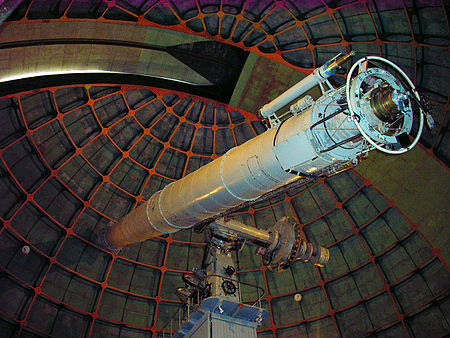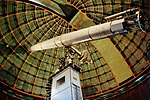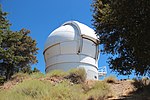James Lick telescope

The James Lick Telescope is a refracting telescope built in 1888. It has a lens 91 centimetres (36 in) in diameter—a major achievement in its day. The instrument remains in operation and public viewing is allowed on a limited basis. Also called the "Great Lick Refractor" or simply "Lick Refractor", it was the largest refracting telescope in the world until 1897 and now ranks third, after the 40-inch refractor at the Yerkes Observatory and the Swedish 1-m Solar Telescope. The telescope is located at the University of California's Lick Observatory atop Mount Hamilton at an elevation of 1,283 metres (4,209 ft) above sea level. The instrument is housed inside a dome that is powered by hydraulic systems that raise and lower the floor, rotate the dome and drive the clock mechanism to track the Earth's rotation. The original hydraulic arrangement still operates today, with the exception that the original wind-powered pumps that once filled the reservoirs have been replaced with electric pumps. James Lick is entombed below the floor of the observing room of the telescope. Here are some excerpts from an 1894 book describing the telescope:
Excerpt from the Wikipedia article James Lick telescope (License: CC BY-SA 3.0, Authors, Images).James Lick telescope
Observatory Peak Road,
Geographical coordinates (GPS) Address Nearby Places Show on map
Geographical coordinates (GPS)
| Latitude | Longitude |
|---|---|
| N 37.341111111111 ° | E -121.64305555556 ° |
Address
Lick Observatory (University of Calfornia Lick Observatory)
Observatory Peak Road
95140
California, United States
Open on Google Maps










